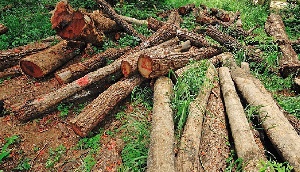Deforestation is contributing irrefutably to climate change, putting natural resources and livelihoods at risk. With two years left to deliver on the goal of zero commodity-driven deforestation by 2020, delegates from the private sector, government, civil society and academia were reminded this week in Ghana’s capital, Accra, of the need for urgent action.
“The forests are an integral part of the environmental commons. We need to view forests as a contributor to all issues and the entire sustainability agenda,” said Naoko Ishii, CEO and Chairperson of the Global Environment Facility, in her keynote address, adding “we have 30 months to make headway on an agenda where we’re falling behind.”
The urgency of the issue was reiterated by Frances Seymour, Distinguished Senior Fellow at the World Resources Institute: “Time is running out and we really need to get on with it”.
Seymour’s address was backed by satellite imagery on the EarthTime platform that showed the rapid pace at which tropical forests in Latin America and South East Asia had been cleared to make way for the production of soy in Brazil and palm oil in Indonesia, causing environmental degradation and the loss of biodiversity.
She told delegates that 2016 was a record-breaking year for tree-cover loss, with an area the size of New Zealand being destroyed, and suggested it was no coincidence that the natural disasters of 2017 were equally record-breaking. “The climate is changing,” she said. “Nature is telling us it is urgent to address the problem of deforestation.”
The three-day gathering is the first time the Tropical Forest Alliance 2020 (TFA2020) General Assembly has met on the African continent since the World Economic Forum became the host of the TFA 2020 in 2015.
The meeting in Accra was a recognition of the significance of Africa’s tropical forests to the health and biodiversity of the planet. Half of the plants and a third of the animals found in the Guinean Forests of West Africa, for example, can be found nowhere else on Earth. The vast rainforest of the Congo Basin is the second largest in the world after the Amazon.
While the source of threats to the Amazon and the Congo Basin may differ, the meeting on 15 May, entitled ‘Sprint to 2020’ sought to underscore how critical all forests are to achieving both climate change and sustainable development goals, and to provide a platform for multi-stakeholder dialogue and partnership to end commodity-driven deforestation.
Norway’s ambassador to Ghana, Gunnar Andreas Holm, spelled out the roles for the various stakeholders as he saw them: companies need to commit to greater transparency and sustainability; governments need to incentivize good behaviour; and civil society need to act as watchdogs, while consumers drive change by demanding sustainably-sourced goods. There was also the need for better research to inform decision making and universities had a role to play in this.
But knowing what must be done and then doing it, is a gap many admitted continued to exist. “What hasn’t happened is alignment of our commitments,” said Africa Regional Director at Proforest, Abraham Baffoe. Chadian indigenous activist Hindou Ibrahim suspected the lack of progress was related to incentive structures. Forests “make money for some while making others more vulnerable,” she said, before adding: “And that’s sad. Not for the economy, but for our lives. Our lives, our market, our pharmacy is the forest.”
Still, there were solutions a-plenty, from the plenaries, the break-out sessions and a ‘solutions marketplace’ where more than 20 organisations exhibited their work and triggered dynamic discussions around concrete tools and resources available to tackle the problem and collaborate more effectively, in line with the 10 priorities defined in TFA 2020’s Commodities and Forests Agenda.
A collaborative partnership between companies and the governments of Ghana and Cote d’Ivoire was repeatedly highlighted as a unique approach to a complex problem. Speaking of his organisation’s involvement in the Cocoa and Forests Initiative, Joseph Larrose, group director of sustainability at Touton SA, said: “The complexity in the supply chain had to be recognised. We needed to be humble. I believe the industry is facing their responsibility, but it’s shared.”
Ultimately, as British High Commissioner to Ghana, Iain Walker, suggested, the narrative has to change along with working practices. “When we destroy something made by man we call it vandalism. When we destroy something made by nature we call it progress. Our school children know the causes of the problem, we know the causes of the problem. We cannot feign ignorance.”
Hoping to galvanize the gathering toward action, closing keynote speaker M. Sanjayan, CEO of Conservation International, summarised the shared nature of the challenge: “Collectively we’re not making progress.
It’s no longer sufficient for one company or one country to say ‘we’re doing the right thing’. My plea: think really ambitiously, at a scale we haven’t considered before. The Titanic is sinking and we’re going around thinking about who has the life jackets. We either all sink or swim together.”
General News of Wednesday, 23 May 2018
Source: Tropical Forest Alliance 2020

















